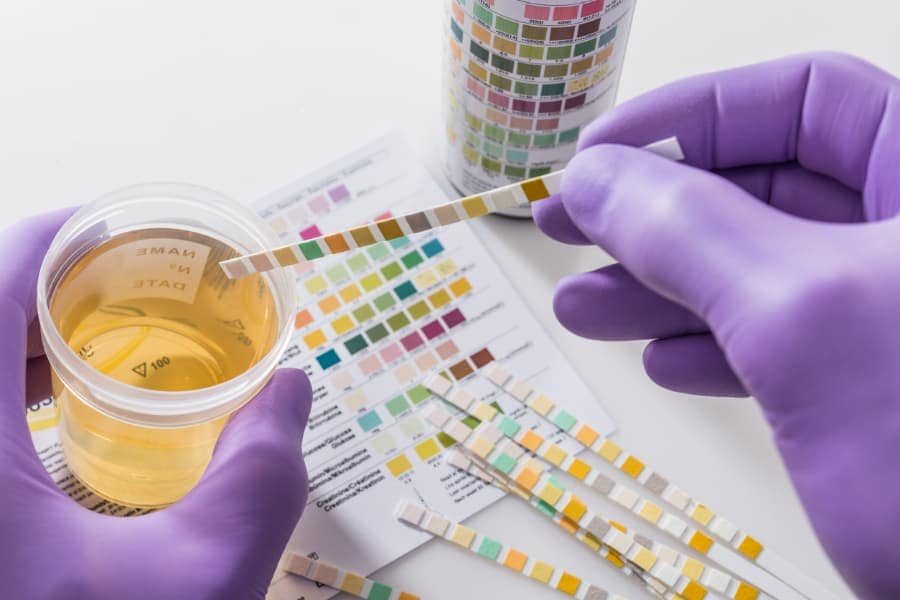It is often startling to discover blood where it should not be. Blood in urine, or hematuria, is not always serious. When it is, however, prompt medical treatment is essential to ensure full recovery. Richmond University Medical Center maintains a Urology Services Center through its Richmond Health Network in Staten Island, New York. Learn what blood in urine means, what might cause it, and when patients should talk to a physician.
What Is Blood in Urine?
Blood in urine, also called hematuria, is a frequent complaint from urology patients. According to the National Institute of Diabetes and Digestive and Kidney Diseases, approximately one in five urology patients are diagnosed with hematuria. It may make blood look pink, red, or brown, depending on the amount of bleeding. In other cases, it does not discolor the urine at all and only becomes evident through a urine test. Most hematuria is painless. However, passing a blood clot through urine may hurt.
Hematuria is associated with a wide array of conditions, ranging from vigorous exercise to cancer, and sometimes is not a sign of disease at all. Many causes are harmless. Others are more alarming. For this reason, it is important to speak with a physician after noticing any amount of blood in urine. Only a medical professional can rule out potential causes and arrive at a conclusive diagnosis.
Causes for Blood in Urine
As stated, blood in urine may have many causes. It can be difficult to identify the reason without running diagnostic tests. These are just a few of the most common causes of hematuria:
- Hard exercise
- Medicines that affect blood clotting
- Hemophilia and other blood clotting disorders
- Urinary tract infection (UTI)
- Pyelonephritis, an infection of the kidney
- Cystitis, or an inflamed bladder
- Ureteral, bladder, or kidney stones
- Urinary tract trauma or injury
- Kidney disease
- Sickle cell disease
- Cancer of the bladder, kidney, urethra, or ureter
Some causes of bloody urine differ depending on sex and gender. The following potential diagnoses are unique to men:
- Enlarged prostate/benign prostate hyperplasia (BPH)
- Prostate cancer
Meanwhile, blood in urine for women may be caused by:
- Menstruation
- Endometriosis, where the uterus liner grows outside of the uterus
While some of these causes for hematuria are minor, others are potentially fatal. This is why blood in urine should never be ignored. The bleeding may be the first and only indicator of a serious health concern. By consulting a physician and identifying the problem early, patients greatly improve their chances for successful treatment and recovery.
How Do Physicians Diagnose Blood in Urine?
When patients visit a urologist for hematuria, the urologist begins with a review of their medical history. This will highlight any past or current conditions that may be responsible for blood in urine. There will also be a physical exam, including a digital rectal exam (for men) or a pelvic exam (for women). The urologist may also request other diagnostic tests, including:
- Urinalysis: This test involves taking a urine sample to be tested for blood cells, pathogens, and other indicators that may point toward a diagnosis.
- Blood test: If hematuria is caused by a genetic disease, blood clotting disorder, kidney problem, or cancer, blood tests may highlight the problem.
- Biopsy: The physician may also take a small tissue sample from the bladder or kidney. The sample will be analyzed for signs of damage or disease.
- Imaging tests: Computed tomography (CT), magnetic resonance imagery (MRI), and ultrasounds help form digital images of the urinary tract.
- Cystoscopy: Sometimes, diagnosis requires a closer look. Cystoscopy uses a long, thin camera to visually examine inside the urethra and bladder.
In some cases, the cause of blood in urine may not be diagnosed right away. Patients may be asked to return for further testing. This follow-up is especially important for patients at risk of cancer. The sooner cancer or another serious disease is discovered, the more effectively it can be treated.
Treating Blood in Urine
The appropriate treatment for blood in urine depends on its cause. After forming a conclusive diagnosis, physicians will propose a treatment plan that addresses hematuria at its source. Antibiotics and other prescription medicines are enough to successfully treat many causes of blood in urine. Radiation, immunotherapy, or chemotherapy may be required for cancer.
Discover Causes of Blood in Urine
Always speak with a physician after discovering blood in urine. If the diagnosis is minor, no treatment may be necessary. If the bleeding is caused by a significant health concern, however, a prompt response is vital to recovery. Richmond University Medical Center treats blood in urine and other related concerns at the Urology Services Center in Staten Island, NY, part of Richmond Health Network. Contact us today to schedule an appointment.




